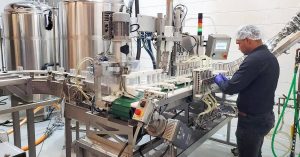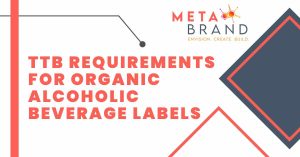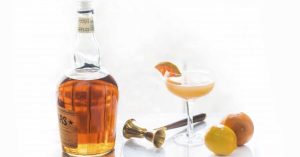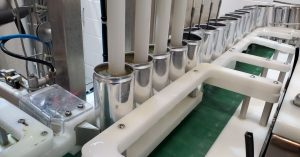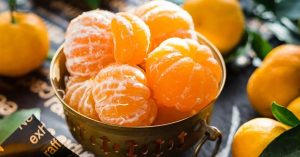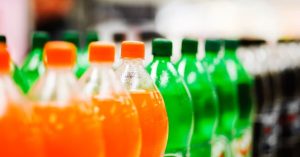Drink sweeteners, artificial or natural, are a key ingredient in many of our favorite beverages. They make drinks taste sweeter, add texture and flavor, and enhance their nutritional value. Beverage entrepreneurs, when developing and formulating their products, must do due diligence to select the right sweetener for their product line.
Beverage sweeteners vary in cost, mouthfeel, texture, and caloric value, affecting your product’s overall taste, nutrition, and pricing. You will want to consider the production cost, health benefits, shelf life, and other criteria when selecting a sweetener. The following is a guide to help you understand the different types of beverage sweeteners, how they vary, and factors to consider when choosing.
What Are Beverage Sweeteners?
Beverage sweeteners are used to sweeten drinks like soda, energy drinks, and juices. Sweeteners come in both natural and artificial forms. Natural forms include sugar, honey, agave, maple, and molasses.
Artificial sweeteners, on the other hand, are chemically produced or synthesized in the lab to mimic the taste of natural sugars but with a low glycemic load. Examples include aspartame, acesulfame potassium (Ace-K), saccharin, and sucralose.
The increasing awareness of health and wellness has created a demand for calorie-free or low-calorie sweeteners that hold their sweetness, such as stevia extract, monk fruit extract, and erythritol. Savvy entrepreneurs are taking advantage of these healthier sweeteners to create better-for-you products.
Common Drink Sweeteners Terminology
Added sugar, total sugar, mouthfeel, texture, glycemic load, and caloric value are typical terms used when selecting sweeteners for beverages. Understanding these terms and their nuances is critical, as each impacts your product’s nutritional value and taste.
- Added sugar: Refers to sweeteners added to drinks during production, primarily to enhance the taste and texture. Naturally occurring sugars from dairy, vegetables, and fruits are not included in the added sugar count. The U.S. Food and Drug Administration (FDA) requires that added sugars be declared on the Nutrition Facts label to help consumers make informed choices. The Dietary Guidelines for Americans (DGA) recommends limiting added sugars to 10% of your daily calorie intake.
- Total sugar: The combined amount of naturally occurring and added sugars in the beverage. You should declare this value on the Nutrition Facts label.
- Mouthfeel and texture: The thickness, density, slipperiness, and smoothness felt in the mouth when consuming a beverage. It gives your product its unique character, texture, and flavor.Mouthfeel varies according to the type of sweetener used; some produce a lighter and smoother texture, while others create a thicker and heavier feel. Beverage enthusiasts increasingly combine different sweeteners to balance the texture and taste of their drinks.
- Glycemic load: Refers to the amount of carbohydrates in a food that raises your blood sugar levels. A low glycemic load is desirable for those trying to regulate their blood sugar levels, as it can help reduce or manage chronic diseases such as diabetes, obesity, and heart disease. Artificial sweeteners have the lowest glycemic load, while natural sugars have the highest.
- Caloric value: The amount of energy (measured in calories) a sweetener provides. Naturally occurring sugars have the highest caloric load, while artificial sweeteners have no calories and are considered non-nutritive.
Understanding how these terms relate to selecting beverage sweeteners is vital to ensuring you develop your product’s ideal taste and texture. It also helps to learn the different factors that affect your beverage sweetener selection.
Factors That Affect Sweetener Selection
Drink formulation is complex and requires a thorough understanding of the form, flavor, pH level, texture, caloric value, and cost-effectiveness. Sweetener selection is often a decision that has long-term implications. Consider these factors when selecting a sweetener:
1. Flavor Profile
Different sweeteners have distinct flavor profiles. Natural sugars have a mild sweetness, while artificial sweeteners can have a metallic or bitter aftertaste. You need to strike a balance between sweetness and flavor to create the ideal taste. Sweeteners also react differently when exposed to heat or light, impacting the overall taste.
2. Beverage Sweetener Production Costs
Sweeteners vary widely in cost. Natural sweeteners like agave, honey, and maple syrup are typically more expensive than artificial sweeteners due to their limited availability, higher production costs, and complex extraction processes.
Artificial sweeteners can be cost-effective, but their lack of nutritional value may require additional ingredients to enhance the flavor or texture.
3. Shelf Life
Shelf life is how long your product is expected to stay fresh and retain its flavor. Sweeteners can affect shelf life, and some may not be suitable for products with longer shelf-life expectations.
Exposure to heat and light can accelerate the breakdown of some sweeteners, resulting in a shorter shelf life. Natural sweeteners often have a shorter shelf life than artificial sweeteners and may produce off-flavors over time.
4. Health Information and Safety
The growing consumer demand for healthier products has increased awareness of beverage sweeteners’ impact on our well-being. Natural sweeteners have a higher nutritional value, while artificial sweeteners are calorie-free and contain no nutritive value.
Use natural sweeteners in moderation, as they can contain significant amounts of sugar and calories that can cause spikes in blood sugar levels. The FDA monitors the safety of artificial sweeteners and approves their use in food and beverage products.
Selecting the right sweetener is critical to ensuring your product meets safety and health standards and satisfies customer taste expectations. It’s important to understand the nuances of each sweetener and how they will affect your product’s flavor, texture, production cost, shelf life, and health profile. Knowing this information can help you decide which sweetener is right for your product.
Types of Beverage Sweeteners
Beverage sweeteners are classified into two broad categories: natural and artificial sweeteners. There’s a wide range of options within each.
Natural Sweeteners for Drinks
These are naturally occurring sugars, typically extracted from plants or fruits. They include:
- Sugar: Sugar is the most recognizable natural sweetener and is the benchmark by which other sweeteners are compared. You can instantly recognize its sweetness, mouthfeel, and texture. Sugar contains four calories per gram and has the highest glycemic load. It’s not ideal for customers looking for low-calorie or calorie-free options.
- Honey: A great choice for organic, health-conscious products, honey is gaining popularity as a natural sweetener due to its low glycemic load and high nutritional value. It has a distinct earthy flavor and contains 3.3 calories per gram.Honey is a great choice for organic, health-conscious products and adds complexity to your beverage’s flavor profile. It has an excellent shelf life, but mixing it in a drink makes it susceptible to darkening, losing intensity, and developing off-flavors. You must be mindful and extra careful when working with honey.
- Agave: Derived from the blue agave plant, this sweetener is gaining traction due to its low glycemic index, high-solids content, and neutral taste. It has a light and delicate sweetness that can add character to a beverage.Agave is a great alternative to honey and works well in low-calorie drinks. It has a shelf life of up to 2 years in its dry form but can darken and become rancid when mixed with a beverage and stored poorly.
- Maple syrup: This natural sweetener has a distinctive taste and is gaining popularity in many areas due to its high antioxidant content, vitamins, minerals, and low glycemic index. It has a distinct caramel-like flavor and contains three calories per gram. When used in beverages, it can add complexity to the flavor profile.
The cost implications of using natural sweeteners must be considered when formulating a beverage. Natural sweeteners can become expensive and may not be the most cost-effective choice. Artificial sweeteners can sometimes be a more economical choice.
Artificial & Sugar Free Sweeteners for Beverages
These are synthetic sweeteners, often calorie-free and non-nutritive, produced in a lab. The FDA classifies them as high-intensity sweeteners due to their inherent sweetness. They include:
- Aspartame: A calorie-free sweetener made from aspartic acid and phenylalanine. It’s around 200 times sweeter than sugar and is a common ingredient in diet drinks. You need only a small amount to achieve the desired sweetness.
- Sucralose: Around 600 times sweeter than sugar, sucralose is calorie-free and has a clean, sweet taste. It has excellent per-unit cost savings, as you only need 0.02 g to achieve the same sweetness as 10 g of sugar.Sucralose is also heat stable, so it’s excellent for beverages requiring pasteurization or sterilization.
- Acesulfame potassium: Commonly known as Ace-K, this calorie-free sweetener is 200 times sweeter than sugar and is often blended with other sweeteners like sucralose to improve the flavor profile and shelf life.Ace-K was approved by the FDA in 1988 but has significantly fallen out of favor today, except in the diet soda sector. It has a bitter aftertaste and can’t be used as a standalone sweetener.
- Stevia: Popular in all drink types, stevia is a calorie-free sweetener extracted from the stevia plant leaves. It has an intensely sweet taste, around 300 times greater than sugar, and a lingering aftertaste.Stevia is non-fermentable and heat- and pH-stable, making it an ideal choice for your beverage products – however, it has a short shelf life and a bitter aftertaste. You can blend it with another sweetener or add natural flavors to mask the off-taste.
The sweeteners you select for your beverage products depend on individual preferences, cost considerations, and your desired flavor profile. The best way is to experiment with different sweeteners and combinations until you find the one that works for you – or you can skip all that hassle by working with an experienced beverage product developer who can guide you through the selection process.
What is Allulose, and Why is it an Attractive Sweetener for Beverages?
Allulose is a unique sweetener gaining popularity due to its tantalizing similarity to regular table sugar. It delivers the same delightful taste, texture, and even contributes to the browning effect in foods, making it an ideal candidate for various culinary applications.
Why Choose Allulose for Beverages?
- Calorie-Friendly Sweetener:
- One of the most appealing aspects of allulose is its low-calorie count. While it resembles sugar closely, allulose contributes only about 0.2 calories per gram. This makes it an attractive option for those looking to reduce calorie intake without sacrificing sweetness.
- FDA Regulations:
- In April 2019, the FDA determined that allulose could be excluded from the Total and Added Sugars figures on Nutrition Facts labels. This regulatory aspect highlights its potential to serve as a guilt-free sweetening solution in beverages, keeping sugar counts low while still providing a sweet experience.
- Versatile Applications:
- Whether it’s used in low-calorie sodas, non-carbonated drinks, or coffee mixes, allulose seamlessly integrates into a wide range of beverages. Its adaptability helps it serve various consumer needs from fitness enthusiasts to those simply watching their sugar intake.
Allulose shines as a low-calorie, sugar-like alternative that satisfies the craving for sweetness without the associated sugar content, making it a smart choice for today’s beverage industry.
What is Ace-K, and What Are the Potential Health Risks and Safety Recommendations?
Ace-K, short for acesulfame potassium, is a popular artificial sweetener introduced in the United States in 1988. It is commonly used in combination with other sweeteners, like aspartame, to enhance flavor profiles in products, especially those that need to remain stable under heat and acidic conditions.
Common Uses
Ace-K frequently appears in sugar substitutes and zero-calorie beverages. It’s labeled as acesulfame K or acesulfame potassium and is utilized in products like Splenda and Equal. You’ll often find it in zero-sugar soft drinks such as Diet Coke and Coke Zero, where it helps create a comparable taste without sugar’s caloric content.
Historical Context
Developed in 1967 by German researchers, Ace-K gained approval for use in the European market by 1983. In the U.S., it received FDA approval in 1988 for limited categories, with broader usage authorized in 2003. Despite its widespread acceptance, Ace-K has faced scrutiny from consumer advocates who have questioned its safety.
Safety Recommendations
The FDA has established a guideline for the safe consumption of Ace-K, advising a limit of 15 milligrams per kilogram of body weight each day. In contrast, the European Union’s Food Safety Agency suggests a slightly lower maximum of 9 milligrams per kilogram per day. These guidelines help consumers determine a safe level of daily intake.
Potential Health Risks
Concerns around Ace-K primarily focus on its safety profile. The Center for Science in the Public Interest has criticized early safety studies, claiming they lacked thoroughness and didn’t examine effects during gestation. Notably, research has found Ace-K present in the breast milk of lactating women, indicating its significant transmissibility.
Moreover, ongoing debates persist regarding Ace-K’s potential links to serious health issues. Critics argue that it may be carcinogenic, could disrupt hormones, and pose risks to pregnant women. While these claims continue to be investigated, they have contributed to the ongoing discussion about the long-term safety of Ace-K consumption.
By understanding Ace-K’s uses, history, safety guidelines, and associated health concerns, consumers can make more informed choices regarding its inclusion in their diet.
Position Your Beverage Business for Success with the Professionals
MetaBrand is your trusted partner for creating unique, market-ready beverage solutions. We have the expertise, experience, and resources to help you formulate the perfect beverage product for your business.
Our beverage experts will guide you through every step, from conceptualization and research to ingredient selection, formulation, and production. We understand that your business needs are unique. We strive to create a beverage product tailored just for you, so contact us today and discover how we can help you rise to the top.
Beverage Sweetener FAQ’s
What is the healthiest sweetener to use?
The healthiest sweetener to use can vary depending on individual preferences and dietary needs. However, some options are generally considered healthier than others. Here are a few commonly recommended sweeteners:
- Stevia: Stevia is a natural, zero-calorie sweetener derived from the stevia plant. It has a negligible effect on blood sugar levels and is considered safe for most people, including those with diabetes. Look for pure stevia extract or powdered stevia without additives.
- Monk Fruit Extract: Monk fruit extract is another natural sweetener that contains zero calories and has no impact on blood sugar levels. It is derived from the monk fruit and provides a sweet taste without the need for added sugars.
- Erythritol: Erythritol is a sugar alcohol that occurs naturally in some fruits. It has a low glycemic index and contains fewer calories compared to regular sugar. Erythritol is also known to have a minimal impact on blood sugar levels and does not promote tooth decay.
- Raw Honey: Raw honey is a natural sweetener that contains antioxidants, vitamins, and minerals. It is important to note that raw honey should be consumed in moderation due to its high calorie and sugar content. Additionally, it is not recommended for infants under one year old due to the risk of botulism.
- Maple Syrup: Pure maple syrup is derived from the sap of maple trees. It contains small amounts of minerals such as calcium, potassium, and zinc. However, similar to honey, maple syrup is high in calories and should be used sparingly.
What is the safest artificial sweetener to use?
Artificial sweeteners are regulated and considered safe for consumption by regulatory authorities, such as the U.S. Food and Drug Administration (FDA) and the European Food Safety Authority (EFSA). The safety of artificial sweeteners has been extensively studied, and they are generally recognized as safe when consumed within acceptable daily intake levels. Here are some commonly used artificial sweeteners:
- Aspartame: Aspartame is one of the most widely used artificial sweeteners and is commonly found in diet sodas, sugar-free products, and tabletop sweeteners. It is made up of two amino acids and has a sweetness similar to sugar. However, individuals with phenylketonuria (PKU), a rare genetic disorder, should avoid aspartame as their bodies cannot metabolize the amino acid phenylalanine found in aspartame.
- Sucralose: Sucralose is derived from sugar and is approximately 600 times sweeter. It is used in a variety of food and beverage products and is known for its heat stability, making it suitable for baking. Sucralose passes through the body mostly unchanged and has a minimal effect on blood sugar levels.
- Saccharin: Saccharin has been used as an artificial sweetener for over a century. It is commonly found in tabletop sweeteners, processed foods, and beverages. Saccharin was once thought to be a potential carcinogen but subsequent research has shown it to be safe for human consumption. However, some studies suggest that high doses of saccharin may have adverse effects in rats, although the relevance to humans is uncertain.
- Acesulfame Potassium (Ace-K): Acesulfame potassium is often used in combination with other sweeteners to enhance sweetness. It is heat-stable and is found in a wide range of food and beverage products. The FDA has determined that Ace-K is safe for consumption.
What sweetener is in Coke Zero?
Coke Zero, a sugar-free variant of Coca-Cola, contains a blend of artificial sweeteners to provide its sweet taste without the added sugar and calories. The specific sweeteners used in Coke Zero may vary depending on the region and formulation, but one common combination is aspartame and acesulfame potassium (Ace-K). These artificial sweeteners provide the desired sweetness with minimal impact on blood sugar levels. It’s important to note that the formulation of Coke Zero can change over time, so it’s always a good idea to check the product label for the most up-to-date information on ingredients.
Which sweetener is best for drinks?
The choice of sweetener for drinks depends on personal preference and dietary needs. Different sweeteners have varying levels of sweetness and may interact differently with the flavors and textures of beverages. Here are some common sweeteners used in drinks:
- Sugar: Sugar (sucrose) is a natural sweetener commonly used in various beverages. It provides sweetness and helps balance flavors. However, sugar is high in calories and can contribute to weight gain and other health issues when consumed in excess.
- Artificial Sweeteners: Artificial sweeteners such as aspartame, sucralose, and saccharin are commonly used in sugar-free or diet drinks. They provide sweetness without adding calories or significantly impacting blood sugar levels. Artificial sweeteners can be useful for individuals looking to reduce their sugar intake or manage diabetes, but they may have a slightly different taste compared to sugar.
- Stevia: Stevia is a natural, zero-calorie sweetener derived from the stevia plant. It is often used as an alternative to sugar in beverages. Stevia has gained popularity due to its perceived natural origin and minimal impact on blood sugar levels.
- Syrups: Various natural syrups, such as maple syrup, agave syrup, or honey, can be used as sweeteners in drinks. These syrups add sweetness and provide distinct flavors. However, it’s important to note that these syrups still contain calories and should be consumed in moderation.



